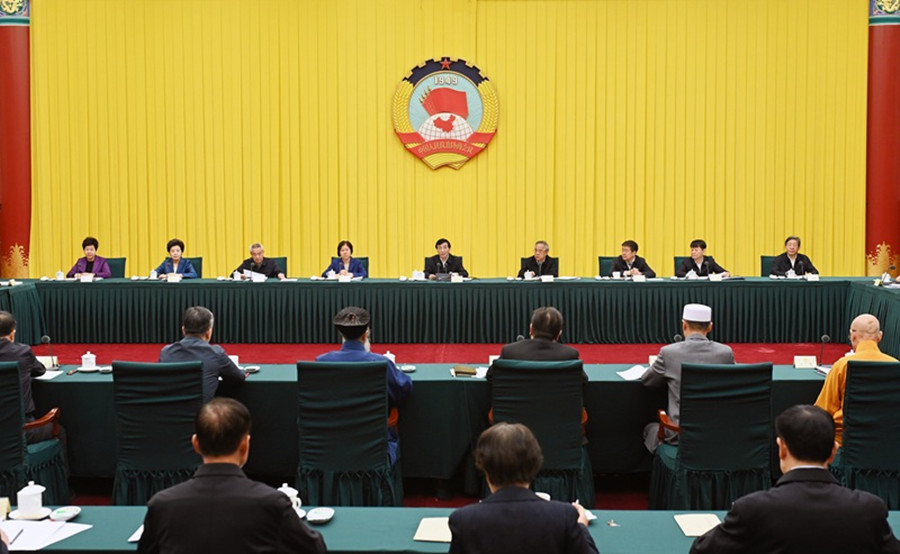Wang Huning stresses enhancing law-based governance of religious affairs

Wang Huning, a member of the Standing Committee of the Political Bureau of the Communist Party of China Central Committee and chairman of the Chinese People's Political Consultative Conference (CPPCC) National Committee, presides over the 30th biweekly consultation session of the 14th CPPCC National Committee in Beijing on April 24, 2025. [Photo by Jiang Guidong/CPPCC Daily]
The 14th National Committee of the Chinese People's Political Consultative Conference (CPPCC) held its 30th biweekly consultation session in Beijing on April 24, focusing on strengthening the law-based governance of religious affairs.
Wang Huning, a member of the Standing Committee of the Political Bureau of the Communist Party of China (CPC) Central Committee and chairman of the CPPCC National Committee, presided over the session.
Wang noted that, since the 18th CPC National Congress in 2012, the CPC Central Committee has upheld the principle of developing religions in the Chinese context, strengthened the law-based governance of religious affairs, and proactively guided the adaptation of religions to socialist society. CPPCC members need to fully grasp the guiding principles of the central leadership's instructions on religious work so as to provide more targeted and effective proposals, he said.
Noting the special significance of religious work in the overall work of the CPC and the State, Wang said the capacity to handle religion-related affairs with a law-based mindset and legal means should be enhanced.
Efforts are needed to enhance research on key issues in the governance of religious affairs and provide feasible suggestions through various channels, including proposals, speeches, inspections and surveys, he said. CPPCC members in the religious sector should facilitate the implementation of policies and measures concerning law-based governance of religious affairs, promote full and rigorous governance of religions, and improve rules and regulations within religious organizations, he added.
He called for active efforts to publicize the Party and nation’s principles and policies as well laws and regulations on religious work, in order to enhance the awareness of the nation, of citizenship, and of the rule of law among religious personages and followers, ensuring that religious activities are conducted in accordance with the Constitution and laws.
He also called for more international exchanges in religious affairs, fully leveraging platforms such as the Religions for Peace and the Asian Conference of Religions for Peace to tell China's stories on religious development.
Eleven members of the CPPCC National Committee and an expert shared their insights. They emphasized the importance of improving legal frameworks for religions, training on religious policies, and online administration of religious affairs, in a bid to enhance law-based governance of religious affairs.
They called for support for the religious community's efforts to implement strict governance, strengthen ideological guidance and legal publicity, and establish religious discipline systems that align with socialist legal principles and the development of the times. They also highlighted the importance of governance system within religious organizations in ensuring law-abiding, safe and orderly running of religious activities.
CPPCC National Committee vice-chairpersons Hu Chunhua, Shen Yueyue, Bater, Shao Hong, Mu Hong, Xian Hui, Wang Dongfeng, and Qin Boyong attended the session. Senior officials from the CPC Central Committee's United Front Work Department, Commission for Political and Legal Affairs, and the Cyberspace Administration of China provided briefings and participated in discussions with CPPCC members.
Copyright © The National Committee of the Chinese People's Political Consultative Conference.
All rights reserved. Presented by China Daily.
京ICP备08100501号-1

